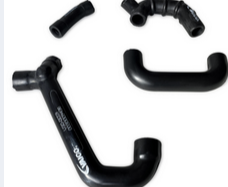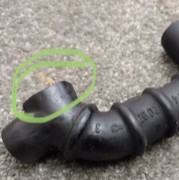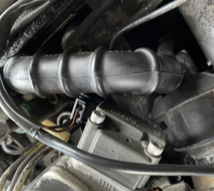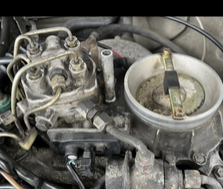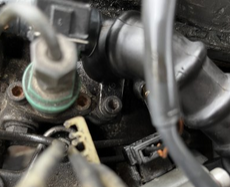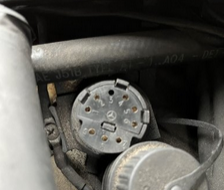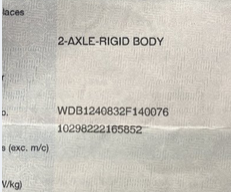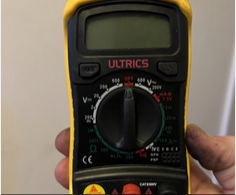
OmahaKnot
Members-
Posts
312 -
Joined
-
Last visited
Everything posted by OmahaKnot
-
The multicontour seats of the 2007 S211 E550 are not functioning.
OmahaKnot replied to FreexPatty's topic in General
The cost for a first-time repair by a reputable independent mechanic is £145, whereas opting for a less reliable approach of randomly replacing components may result in additional expenses without guaranteeing a solution. Have you inspected below the seats for any signs of a loose connection, a damaged piping, or any other noticeable issues? -
I am now in the process of purchasing a whole set of components from Germany. However, I have also arranged for a second-hand set to be delivered by Wednesday, which I think would be beneficial. Fortunately, the automobile has successfully passed its MOT today, with just minor recommendations about the tyres. Therefore, it is essential that my emissions be in compliance with the problem at hand.
-
Hello, I appreciate your response. I have purchased the NGK non-resistor spark plugs that have been highly recommended on this platform. Additionally, I own magnecore blue high-tension (HT) leads that are still covered by warranty. I reverted back to using resistor plugs in order to see whether there was any effect, but, the issues remained same. Consequently, I reinstalled the non-resistor plugs. I own a multimeter, but I am uncertain about its capability to measure duty cycle. Observe the enclosed image. Furthermore, during a test conducted at idle in a neutral state, I saw that when I accelerate in my usual manner, the engine tends to stall. However, when I gradually and slowly increase the acceleration, the engine works smoothly without any stalling issues. Is there a problem with the fuel/air mixture?
-
The car model is 230te. Greetings, everybody. My 230te, which has travelled 160,000 kilometres, has a problem of sluggishness, reluctance, and stalling while accelerating from a complete stop after the engine has reached its operating temperature. The vehicle does not have any problems while starting in chilly conditions and operates well. Once it reaches the desired temperature. After doing thorough research and meticulously examining many relevant factors, I have made several adjustments and verifications related to this matter. Thus far, I have made changes to - The distributor cap and rotor Ignition leads Fuel filter Fuel injectors A device used to remove impurities from the air, often found in ventilation systems or air conditioning units. Overvoltage protection relay Ignition plugs What I have examined and completed: I have inspected the fuel relay for any signs of dry solder, and it is in satisfactory condition. Examined the gasoline strainer and confirmed that it is free from any dirt or debris. Examined the idle control valve - functioning properly Eliminated the auxiliary fuel filter located inside the fuel distributor. Examined both gasoline pumps and performed maintenance on the terminals, confirming their proper functioning. Examined for vacuum leaks - all hoses are undamaged and there are no breaks in the rubber on the fuel distribution unit. Emptied the tank using the gasoline pump outlet located on the back ramps to inspect for any debris - no issues were found. Thus far, I have accomplished the aforementioned tasks, resulting in the automobile now idling in a typical manner, a behaviour it previously lacked. Previously, the engine would have intermittent stalling when it reached operating temperature and was at idle. While driving on the motorway at a speed above 1500 to 2000 revolutions per minute, the vehicle performs optimally. Additionally, during extended journeys lasting over an hour, the symptoms seem to alleviate when encountering start-stop traffic. However, the next day it would resume malfunctioning. Operates smoothly when starting from a cold state. However, once it reaches operating temperature, its performance becomes inconsistent when approaching traffic lights or junctions. It may exhibit little reluctance while accelerating, but then runs smoothly at higher RPMs. Alternatively, it may have a jerking motion or a tendency to stall until the RPMs increase and it runs adequately until the next stop. The engine operates well at idle, but has difficulties when subjected to a heavy workload. I'm perplexed and in need of assistance. Is there anybody here who can help me identify anything that I have overlooked?
-
We have seen no discernible disparity in fuel efficiency or overall performance between our 2019 and 2021 vehicle models under real-world circumstances. The temperature ranges from the low to mid 40's in the M135 and from the upper 30's in the 118i.
-
It seems that the bearings in my rear wheel need replacement. Since both fronts were completed last year, it is reasonable to anticipate this outcome. I am unable to perceive the "woooom-woooom" sound, but there is a persistent low-pitched sound when the speed exceeds 15 miles per hour (not related to tyre noise), and the pitch does vary as I make turns. The increase in drone frequency is directly correlated with the speed of the vehicle on the road, indicating potential issues with the rear wheel bearings, the differential, or the prop-shaft bearing(s). I will be bringing it to Westfield on Wednesday, where they will provide me with a diagnosis.
-
Incorrect, that is a front wheel bearing/hub. The posterior appears in this manner. https://www.ebay.co.uk/itm/304405677475?utm_source=LexusOwnersClubUK&utm_medium=ForumLinks&mkcid=1&mkrid=710-53481-19255-0&siteid=3&customid=link&campid=5338910164&toolid=20001&mkevt=1
-
To the best of my knowledge, on the Classic model, the rev limitation is integrated into the ignition system. This prevents the engine from being excessively revved if the throttle is fully opened while the vehicle is not in gear. In essence, the rev limiter functions as intended by limiting the engine's revolutions per minute.
-
During my apprenticeship, we manually performed such task on BT Morris 1000 vehicles. Deactivate the ignition while descending and reactivate it at the bottom to generate a significant explosion. The exhaust system was forcefully detached. If one chooses to exhibit childish behaviour and the vehicle in question does not belong to them, then this may be seen acceptable. However, as pwood has astutely mentioned, this behaviour will have detrimental effects on the catalytic converters of a P38 vehicle.
-
Unless equipped with a manual gearbox, it is not possible to exceed the maximum revolutions per minute (RPM) of the engine. This is due to the gearbox's electronic control unit (ECU), which automatically shifts gears at the engine's maximum RPM. The only circumstance in which it would be possible to exceed the maximum engine speed while in the highest gear, with the torque converter clutch engaged, is while travelling in a steep downward direction. Exceeding the engine's maximum revolutions per minute would be of little concern to you at that point.
-
The only possibility that comes to me is that there are no saved codes. I plan to schedule a service appointment on Wednesday to address the issue with the ABS ring and see whether it resolves the problem. Do you know how I may remove other posts? My internet was being unreliable and not providing confirmation whether they were successfully posted.
-
Greetings, I am new to this platform and I am unsure whether this is the appropriate place to make a post. I just acquired a second-hand e92 330d SE with 137,000 miles on the odometer. During the 65-mile drive home, I did not encounter any issues except for an intermittent ABS light, which is likely caused by a faulty magnetic ring on the wheel bearing. I have scheduled an appointment for Wednesday to get it repaired. Regardless, I always encounter a yellow transmission fault when the ABS light illuminates. I have examined the ISTA system and also used BimmerLink to investigate the occurrence of the transmission fault, however no error codes are present in the system. I need assistance with the TC. I am perplexed by the codes for the abs and glow plug. Presumably, there would be code saved for the TC.


